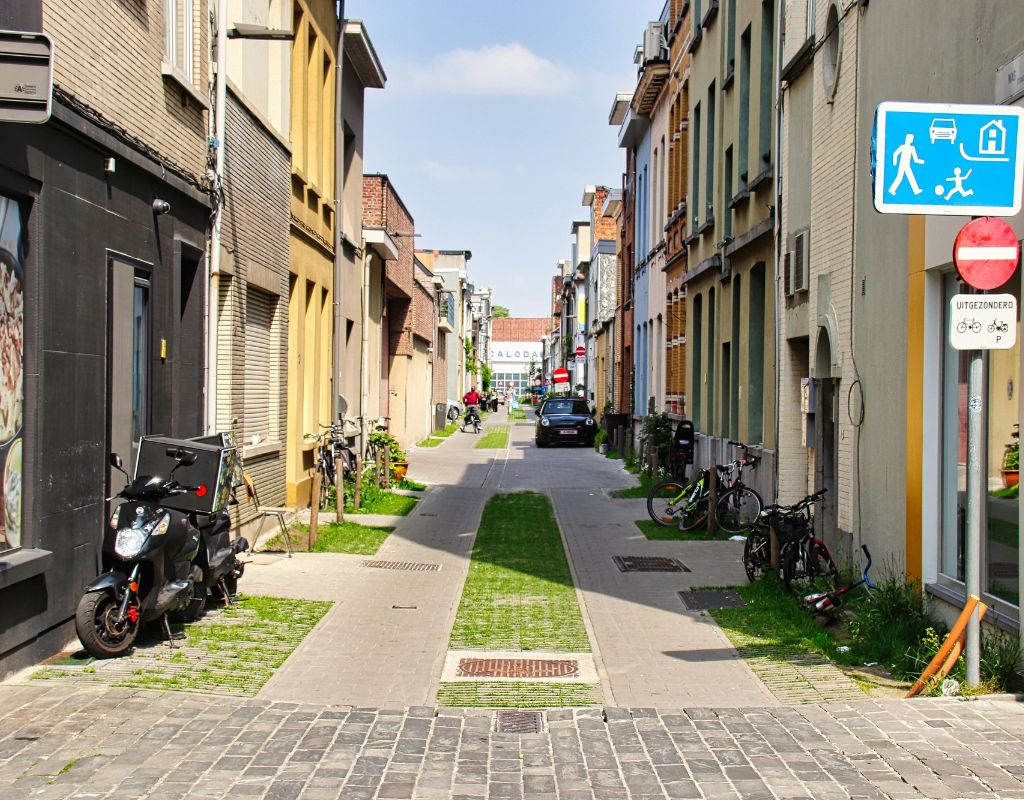Washington state may soon become the "woonerf" capital of America, thanks to a new law that will allow cities to import the famous Dutch street design.
In May, Governor Bob Ferguson signed SB 5595, legalizing “shared streets” which have speed limits as little as 10 miles per hour and which require all vehicles to yield to bicyclists and pedestrians. When it goes into effect at the end of July, it will be the first jurisdiction in the nation to have legal provisions for such low speed limits on the books.
The shared street concept, though, is about more than just speeds. Also known as "woonerven" in The Netherlands and Belgium, where the designs were first popularized — as well as "living streets" and other names around the world — they're typically narrow, often include landscaping, and aim to support a variety of community uses.
The typical American street, by contrast, is wider, faster, and uninviting to all but vehicles — even in dense downtowns with high foot traffic. The average American residential street is 50 feet wide, compared to just 21.7 feet in Dutch cities. Studies show that wider streets promote speeding — and adopting the woonerf concept can reclaim streets for neighbors to call their own.
“[Shared streets] create the kind of environment that everybody wants to live in…where it's beautiful and desirable to be out in the street enjoying the city, meeting their neighbors,” said State Representative Julia Reed, a lead sponsor of the legislation. “There is so much about our communities that are lost when we center it on vehicle traffic as opposed to the people that live there.”
In some ways, Washingtonians were already primed for woonerfs during the pandemic thanks to Seattle's “Safe Healthy Streets” program, which limited access to cars through traffic calming measures to allow community members to recreate safely outside while socially distancing. Seattle’s program has persisted past the darkest days of COVID-19, and still allows neighbors to utilize select streets for block parties and play space without a permit.
“A lot of constituents and residents thought that these were really great,” Reed remarked. “[So we said,] 'What if we adopted this other concept, [the woonerf,] of having a street where people are centered first, but also a street that does also allow car traffic as necessary?”
Reed credits a coalition of community groups and constituents for inspiring the bill — and some local advocates hope it will help transform wannabe woonerfs into true people-centered places.
"The things we call woonerfs in America tend to be far more car-oriented than streets where the European legal definition applies," wrote Mark Ostrow in The Urbanist. "It has become all the rage to affix that label to any curbless street, even ones that are vastly wide with multiple lanes of traffic, or where the primary function is vehicular throughput or access to parking."
While Washington may be the first place to legally permit actual woonerfs, other states and cities across the nation should see it as a guide to adopt the necessary legal changes to positively reconfigure their streets to put people first.
“Shared streets should be relatively inexpensive to implement,” Reed adds. “[This is a solution that] communities can start to adopt right away.”






